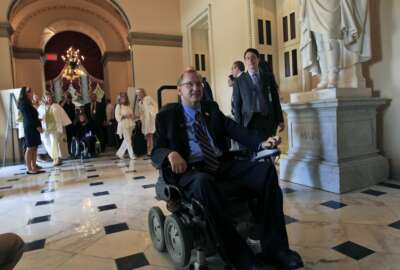To listen to the Federal Newscast on your phone or mobile device, subscribe on PodcastOne or Apple Podcasts. The best listening experience on desktop can be found using Chrome, Firefox or Safari.
- Eighteen senators wrote to National Security Adviser John Bolton asking him to reconsider his plan to merge the White House cybersecurity coordinator’s role into existing positions. The legislators said by eliminating the cyber coordinator role, the government will lack a unified focus against cyber threats. (Sen. Amy Klobuchar)
- One of the largest federal employee unions is suing the Trump administration over one of the executive orders signed last week that curtails the labor contract bargaining window between government and unions. The American Federation of Government Employees’ lawsuit says the EO violates workers’ right to freedom of association. National Treasury Employees Union President Tony Reardon said his team was looking at every word of the executive orders. If there’s a legal path, he said he definitely will encourage the union to take it. (Federal News Radio)
- A new official is leading the Veterans Affairs Department, at least for the time being. The White House named Peter O’Rourke as VA’s new acting secretary. Until yesterday, he served as the department’s chief of staff. Robert Wilkie had been serving as acting VA chief since President Donald Trump fired David Shulkin in March. But Wilkie will need to temporarily step aside, because the president has now nominated him for the job on a permanent basis. Under the federal Vacancies Reform Act, government officials aren’t allowed to fill positions in an acting role if they’re also awaiting Senate confirmation for the same job. (Federal News Radio)
- The Air Force is willing to give at least some of its service members up to $90,000 to stay in uniform for another few years. The service’s latest list of professions eligible for Selective Reenlistment Bonuses now includes 92 different specialties, more than double the number of specialties it targeted for the payouts three years ago. The biggest lump-sum payouts will go to a handful of career fields the Air Force refers to as “battlefield airmen.” (Federal News Radio)
- The Federal Retirement Thrift Investment Board hopes to implement new Thrift Savings Plan withdrawal options by September 2019. The agency said all TSP participants will be able to make withdrawals once every 30 days. The TSP agency is also adding more options for participants to receive withdrawal payments. Participants who have left federal service will have no other limitations other than the 30-day rule to take withdrawals. Participants still in federal service at a certain age can take up to four partial withdrawals a year. (Federal News Radio)
- More Freedom of Information Act requests are heading the Environmental Protection Agency’s way this year. According to FOIAOnline.gov the agency received more than 7,700 FOIA requests in fiscal 2018. In the same period last year, it received 7,500. Last year, the EPA partially granted more than 5,000 requests and denied nearly 800 requests. (Federal News Radio)
- U.S. Citizenship and Immigration is finally moving its Freedom of Information Act request process into the digital age. Up until now, the agency only accepted FOIA requests by mail, fax, and email and requesters usually received their documents on a compact disc. USCIS said requesters who have an immigration court date pending will be the first ones to receive their documents digitally. USCIS Director L. Francis Cissna said the modernization will help reduce the agency’s backlog of cases. (U.S. Citizenship and Immigration Services)
- The Trump administration is enlisting the State Department in a growing dispute with China. Starting June 11, visas of Chinese graduate students in certain high technology fields will be limited to one year in the U.S. Those fields include robotics, aviation and manufacturing. A source told the AP, the White House has already sent instructions to the State Department. China has named several manufacturing categories it wants to dominate, and the Trump administration wants to protect U.S. leadership and intellectual property. (Associated Press)
- A Russian cyber company’s federal procurement death penalty remains intact. It’s official, Kaspersky Lab products and services are banned from federal agencies, at least for the foreseeable future. The District of Columbia District Court yesterday dismissed the company’s lawsuits against the Homeland Security Department and the government more broadly. It was trying to overturn both the 2017 Binding Operational Directive from DHS and the provision in the 2018 Defense Authorization bill that banned it governmentwide. The judge ruled Kaspersky did not plausibly allege that the NDAA constitutes a bill of attainder, and the Russian-based company did not have standing to sue DHS over the BOD. (Federal News Radio)
Copyright
© 2025 Federal News Network. All rights reserved. This website is not intended for users located within the European Economic Area.




